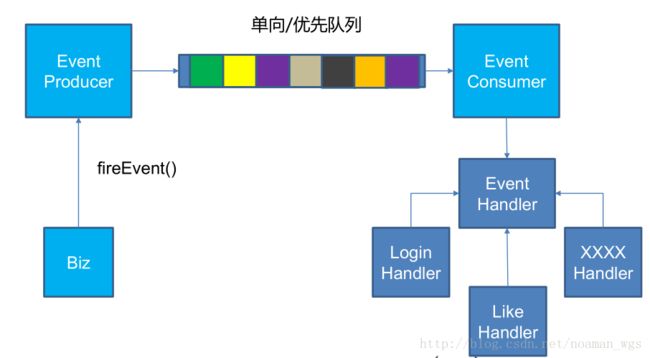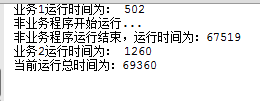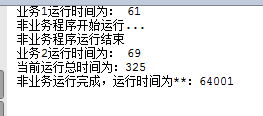Redis应用3-基于Redis消息队列实现的异步操作
Redis实现消息队列的模式
常用的消息队列有RabbitMQ, ActiveMQ, Kafka等,这都是开源的功能强大的消息队列,适合于在企业项目应用。
Redis实现的消息队列代码原理
Redis提供了两种方式来作消息队列。
一个是使用生产者消费模式模式,
另一个就是发布订阅者模式。
前者会让一个或者多个客户端监听消息队列,一旦消息到达,消费者马上消费,谁先抢到算谁的,如果队列里没有消息,则消费者继续监听。
后者也是一个或多个客户端订阅消息频道,只要发布者发布消息,所有订阅者都能收到消息,订阅者都是平等的。
本文采用的是生产者消费者模式。
基于Redis的消息队列实现的异步操作原理图如下:

EventProducer将事件推送到消息队列中,
EventConsumer监听队列,只要监测到有事件到达,就将事件取出,交给对应的Handler进行处理。
代码实现
1. Redis数据库的底层操作:
将事件序列化后存入数据库;从数据库获取事件:
package com.wgs.mailSender.util;
import com.alibaba.fastjson.JSON;
import com.alibaba.fastjson.JSONObject;
import org.slf4j.Logger;
import org.slf4j.LoggerFactory;
import org.springframework.beans.factory.InitializingBean;
import org.springframework.stereotype.Service;
import redis.clients.jedis.Jedis;
import redis.clients.jedis.JedisPool;
import java.util.List;
/**
* Created by wanggenshen_sx on 2017/5/9.
*/
Service
public class JedisAdapter implements InitializingBean{
private static final Logger logger = LoggerFactory.getLogger(JedisAdapter.class);
private Jedis jedis = null;
private JedisPool jedisPool = null;
/**
* 初始化
* @throws Exception
*/
@Override
public void afterPropertiesSet() throws Exception {
jedisPool = new JedisPool("localhost", 6379);
}
/**
* 从JedisPool获取一个Jedis连接
* @return
*/
private Jedis getJedis(){
try {
jedis = jedisPool.getResource();
return jedis;
}catch (Exception e){
logger.error("获取Jedis 异常 :" + e.getMessage());
return null;
}finally {
if (jedis != null){
try {
jedis.close();
}catch (Exception e){
logger.error(e.getMessage());
}
}
}
}
/**
* 存入List集合中
* @param key
* @param value
* @return
*/
public long lpush(String key, String value){
Jedis jedis = null;
try {
jedis = jedisPool.getResource();
long result = jedis.lpush(key, value);
return result;
}catch (Exception e){
logger.error("Jedis lpush 异常 :" + e.getMessage());
return 0;
}finally {
if (jedis != null){
try {
jedis.close();
}catch (Exception e){
logger.error(e.getMessage());
}
}
}
}
/**
* 获取指定值
* @param timeout
* @param key
* @return
*/
public List brpop(int timeout, String key){
Jedis jedis = null;
try {
jedis = jedisPool.getResource();
return jedis.brpop(timeout, key);
}catch (Exception e){
logger.error("Jedis brpop 异常 :" + e.getMessage());
return null;
}finally {
if (jedis != null){
try {
jedis.close();
}catch (Exception e){
logger.error(e.getMessage());
}
}
}
}
/**
* 给Redis中Set集合中某个key值设值
* @param key
* @param value
*/
public void set(String key, String value){
Jedis jedis = null;
try {
jedis = jedisPool.getResource();
jedis.set(key, value);
}catch (Exception e){
logger.error("Jedis set 异常" + e.getMessage());
}finally {
if(jedis != null){
jedis.close();
}
}
}
/**
* 从Redis中Set集合中获取key对应value值
* @param key
*/
public String get(String key){
Jedis jedis = null;
try {
jedis = jedisPool.getResource();
return jedis.get(key);
}catch (Exception e){
logger.error("Jedis get 异常" + e.getMessage());
return null;
}finally {
if(jedis != null){
jedis.close();
}
}
}
/**
* 序列化
* @param key
* @param object
*/
public void setObject(String key, Object object){
set(key, JSONObject.toJSONString(object));
}
public T getObject(String key, Class clazz){
String value = get(key);
if (value != null){
return JSON.parseObject(value, clazz);
}
return null;
}
} 存入Redis中时要存到key对应的集合中,所以要写个产生key的工具类:
RedisKeyUtil.java:
package com.wgs.mailSender.util;
/**
* Created by wanggenshen_sx on 2017/5/9.
*/
public class RedisKeyUtil {
private static String EVENT_KEY = "ASYNC_EVENT_KEY";
public static String getEventQueueKey(){
return EVENT_KEY;
}
}
2. 定义事件的类型
/**
* Created by wanggenshen_sx on 2017/5/9.
*/
public enum EventType {
CAlCULATE(0),
COPYFILE(1),
MAIL(2);
private int value;
public int getValue(){
return value;
}
EventType(int value){
this.value = value;
}
}3.定义事件模型
package com.wgs.mailSender.async;
import java.util.HashMap;
import java.util.Map;
/**
* Created by wanggenshen_sx on 2017/5/9.
*/
public class EventModel {
private EventType eventType;
private int actorId;
private int entityId;
private int entityType;
private int entityOwnerId;
Map exts = new HashMap<>();
public EventModel(EventType eventType){
this.eventType = eventType;
}
public String getExt(String key) {
return exts.get(key);
}
public EventModel setExt(String key, String value) {
exts.put(key, value);
return this;
}
public EventModel(){
}
public EventType getEventType() {
return eventType;
}
public void setEventType(EventType eventType) {
this.eventType = eventType;
}
public int getActorId() {
return actorId;
}
public EventModel setActorId(int actorId) {
this.actorId = actorId;
return this;
}
public int getEntityId() {
return entityId;
}
public EventModel setEntityId(int entityId) {
this.entityId = entityId;
return this;
}
public int getEntityType() {
return entityType;
}
public EventModel setEntityType(int entityType) {
this.entityType = entityType;
return this;
}
public int getEntityOwnerId() {
return entityOwnerId;
}
public EventModel setEntityOwnerId(int entityOwnerId) {
this.entityOwnerId = entityOwnerId;
return this;
}
public Map getExts() {
return exts;
}
public void setExts(Map exts) {
this.exts = exts;
}
}
4.EventProducer.java: 将事件发送到工作队列中
package com.wgs.mailSender.async;
import com.alibaba.fastjson.JSONObject;
import com.wgs.mailSender.util.JedisAdapter;
import com.wgs.mailSender.util.RedisKeyUtil;
import org.slf4j.Logger;
import org.slf4j.LoggerFactory;
import org.springframework.beans.factory.annotation.Autowired;
import org.springframework.stereotype.Service;
/**
* Created by wanggenshen_sx on 2017/5/9.
*/
Service
public class EventProducer {
private static final Logger logger = LoggerFactory.getLogger(EventProducer.class);
@Autowired
JedisAdapter jedisAdapter;
public boolean fireEvent(EventModel eventModel){
try {
//序列化
String json = JSONObject.toJSONString(eventModel);
//产生key
String key = RedisKeyUtil.getEventQueueKey();
//放入工作队列中
jedisAdapter.lpush(key, json);
return true;
}catch (Exception e){
logger.error("EventProducer fireEvent 异常 :" + e.getMessage());
return false;
}
}
}
5. EventConsumer.java : 从工作队列中取出事件进行处理
package com.wgs.mailSender.async;
import com.alibaba.fastjson.JSON;
import com.alibaba.fastjson.JSONObject;
import com.wgs.mailSender.util.JedisAdapter;
import com.wgs.mailSender.util.RedisKeyUtil;
import com.wgs.mailSender.util.ThreadTaskUtil;
import org.slf4j.Logger;
import org.slf4j.LoggerFactory;
import org.springframework.beans.BeansException;
import org.springframework.beans.factory.InitializingBean;
import org.springframework.beans.factory.annotation.Autowired;
import org.springframework.context.ApplicationContext;
import org.springframework.context.ApplicationContextAware;
import org.springframework.stereotype.Service;
import java.util.ArrayList;
import java.util.HashMap;
import java.util.List;
import java.util.Map;
/**
* Created by wanggenshen_sx on 2017/5/9.
*/
Service
public class EventConsumer implements InitializingBean, ApplicationContextAware{
private static final Logger logger = LoggerFactory.getLogger(EventConsumer.class);
@Autowired
JedisAdapter jedisAdapter;
private ApplicationContext applicationContext;
//存储各种type事件对应的Handler处理类
private Map> config = new HashMap<>();
@Override
public void afterPropertiesSet() throws Exception {
//获取所有实现EventHandler的类
Map eventHandlerMap = applicationContext.getBeansOfType(EventHandler.class);
if (eventHandlerMap != null){
for (Map.Entry entry : eventHandlerMap.entrySet()){
//遍历每个EventHandler,将这个EventHandler放到集合对应的type中
EventHandler eventHandler = entry.getValue();
//获取每个EventHandler所关注的事件类型
List eventTypes = eventHandler.getSupportEventType();
for (EventType type : eventTypes){
//初始化的时候config为空
if (!config.containsKey(type)){
config.put(type, new ArrayList());
}
//将Handler放入指定type中
config.get(type).add(eventHandler);
}
}
}
//启动线程从工作队列中取出事件进行处理
Thread thread = new Thread(new Runnable() {
@Override
public void run() {
while (true){
String key = RedisKeyUtil.getEventQueueKey();
//获取存储的(经过序列化的)事件event
List events = jedisAdapter.brpop(0, key);
for (String jsonEvent : events){
if (jsonEvent.equals(key)){
continue;
}
EventModel eventModel = JSON.parseObject(jsonEvent, EventModel.class);
if (!config.containsKey(eventModel.getEventType())){
logger.error("不能识别的事件!");
continue;
}
//获取关注过该事件eventModel的handler,进行处理
for (EventHandler handler : config.get(eventModel.getEventType())){
handler.doHandler(eventModel);
}
}
}
}
});
thread.start();
}
@Override
public void setApplicationContext(ApplicationContext applicationContext) throws BeansException {
this.applicationContext = applicationContext;
}
}
6. EventHandler.java: 处理事件的接口
package com.wgs.mailSender.async;
import java.util.List;
/**
* Created by wanggenshen_sx on 2017/5/9.
*/
public interface EventHandler {
//处理事件
void doHandler(EventModel eventModel);
//获取关注事件的类型
List getSupportEventType();
}
7. FileCopyHandler.java : 事件处理的具体实现类:
package com.wgs.mailSender.async.handler;
import com.wgs.mailSender.async.EventHandler;
import com.wgs.mailSender.async.EventModel;
import com.wgs.mailSender.async.EventType;
import com.wgs.mailSender.util.FileCopyUtil;
import org.slf4j.Logger;
import org.slf4j.LoggerFactory;
import org.springframework.stereotype.Component;
import java.util.Arrays;
import java.util.List;
/**
* Created by wanggenshen_sx on 2017/5/10.
*/
Component
public class FileCopyHandler implements EventHandler {
private static final Logger logger = LoggerFactory.getLogger(CalculateHandler.class);
private static String source = "D:/SQL.zip";
private static String target = "D:/copy/sql1.zip";
@Override
public void doHandler(EventModel eventModel) {
long start1 = System.currentTimeMillis();
//模拟从工作队列中取出的一个事件进行处理
FileCopyUtil.copyFile(source, target);
long end1 = System.currentTimeMillis();
System.out.println("非业务运行完成,运行时间为**:" + (end1 - start1));
}
@Override
public List getSupportEventType() {
return Arrays.asList(EventType.COPYFILE);
}
} 测试
写了一个简单接口,对其进行测试:
package com.wgs.mailSender.controller;
import com.wgs.mailSender.async.EventModel;
import com.wgs.mailSender.async.EventProducer;
import com.wgs.mailSender.async.EventType;
import com.wgs.mailSender.util.FileCopyUtil;
import com.wgs.mailSender.util.JSONUtil;
import com.wgs.mailSender.util.TaskUtil;
import com.wgs.mailSender.util.ThreadTaskUtil;
import org.slf4j.Logger;
import org.slf4j.LoggerFactory;
import org.springframework.beans.factory.annotation.Autowired;
import org.springframework.stereotype.Controller;
import org.springframework.web.bind.annotation.RequestMapping;
import org.springframework.web.bind.annotation.RequestMethod;
import org.springframework.web.bind.annotation.ResponseBody;
/**
* Created by wanggenshen_sx on 2017/5/9.
*/
@Controller
public class EventController {
private static final Logger logger = LoggerFactory.getLogger(EventController.class);
//主业务
private static String source = "D:/HEXO.zip";
private static String target = "D:/copy/1.zip";
private static String target2 = "D:/copy/2.zip";
//非主业务
private static String sourceGame = "D:/SQL.zip";
private static String targetGame = "D:/copy/SQL1.zip";
@Autowired
EventProducer eventProducer;
@RequestMapping(path = {"/event/async"}, method = {RequestMethod.POST})
@ResponseBody
public String eventAsync(){
try{
long start = System.currentTimeMillis();
//模拟主业务1 : 复制文件HEXO.zip到指定文件夹target中
long time1 = FileCopyUtil.copyFile(source, target);
System.out.println("业务1运行时间为: " + time1);
//模拟非主业务: 这个业务可能不是那么很紧急要立刻实现的
System.out.println("非业务程序开始运行...");
long t = FileCopyUtil.copyFile(sourceGame, targetGame);
System.out.println("非业务程序运行结束,运行时间为:" + t);
//模拟主业务2 : 复制文件HEXO.zip到指定文件夹target2中
long time2 = FileCopyUtil.copyFile(source, target);
System.out.println("业务2运行时间为: " + time2);
long end = System.currentTimeMillis();
System.out.println("当前运行总时间为:" + (end - start));
return JSONUtil.getJSONString(0);
}catch (Exception e){
logger.error("eventAsync 异常:" + e.getMessage());
return JSONUtil.getJSONString(1, "failed");
}
}
}
不使用队列处理处理:
主业务1,2是复制一个较小的文件;非主业务是复制一个大小为2G的文件,所以复制时间会比较长。
运行结果:

可以看出,主业务1执行结束以后,开始执行非主业务的操作,由于操作过程时间较长,等了很久直到其复制完毕才去执行主业务2。如果这个过程中非主业务在复制过程出错的话,就会导致整个程序抛出异常,无法执行下去,这可是个致命的问题。
试想下:如果你在一个网站进行注册操作的时候,注册完成会发送一封邮件到你的邮箱。如果这个邮件发送过程时间很长,那么你在注册完成后需要等很久才能进入主页面,这会严重影响用户的体验。
使用Redis队列处理:
如果交给Redis实现的工作队列去处理,在主业务1操作结束后,非主业务开始执行,但非主业务其实并没真正执行而是将这个事件发送到工作队列中,EventConsumer会时刻监听队列,一旦有事件到达立刻取出交由对应的Handler类去处理。而主业务2是在主业务1执行完后就去执行,不用等待这个非主业务执行完毕,也就减少等待时间。
将代码中的非主业务的操作改为交由工作队列去处理:
//模拟非主业务: 这个业务可能不是那么很紧急要立刻实现的
System.out.println("非主业务程序开始运行...");
eventProducer.fireEvent(new EventModel(EventType.COPYFILE));
System.out.println("非主业务程序运行结束");运行结果:

可以看到,主业务1执行结束后,非主业务开始执行,但是并没有真正去立刻执行,而是将事件发送到工作队列中。等待主业务2执行结束后,等了很久非主业务才真正执行结束,这样就实现 了解耦的功能。
基于Redis消息队列实现的邮件异步发送
利基于Redis消息队列实现的异步化框架,将页面注册与邮件发送解耦,实现在注册成功后异步发送邮件的功能。 运行项目的时候: 需先开启Redis服务。
项目地址如下:https://github.com/nomico271/AsyncMailSend
参考:
http://www.jianshu.com/p/9c04890615ba